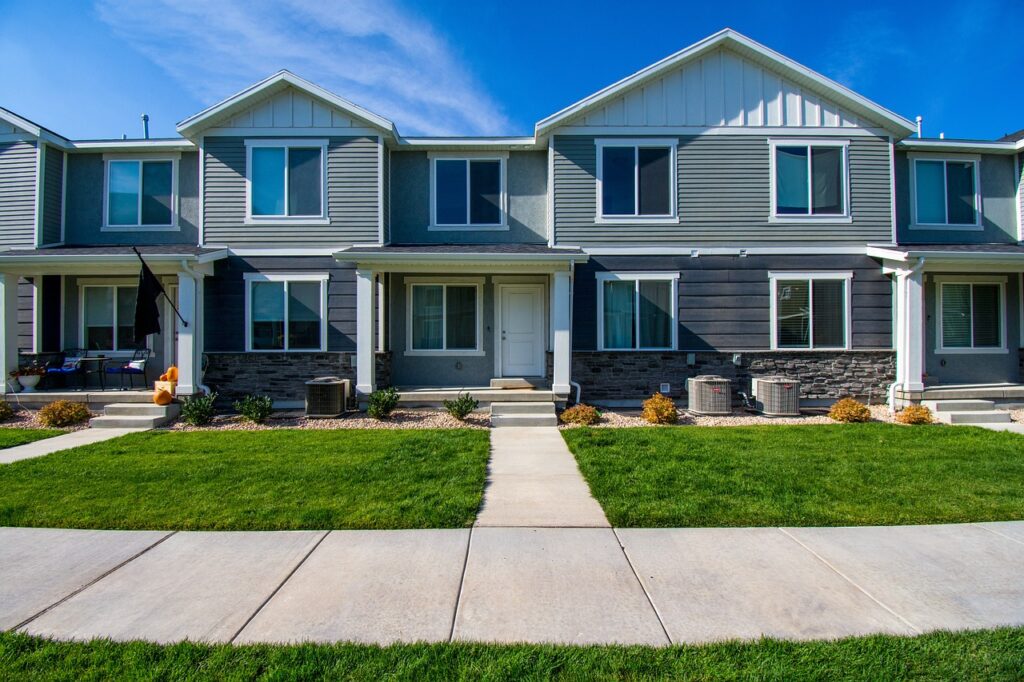Buyers GIVE UP As Homeownership Costs Rising EXPONENTIALLY
“Buyers GIVE UP As Homeownership Costs Rising EXPONENTIALLY” sheds light on the current state of the housing market in the United States. According to the BMO Real Financial Progress Index, nearly two-thirds of Americans planning to buy a home have postponed their search until mortgage rates come down. Economic uncertainty is also a major factor, with 65% of respondents delaying their homebuying plans. The reliance on interest rates as a determining factor for purchasing a house reveals a lack of understanding in the housing market. Furthermore, the survey highlights that 43% of respondents are unsure if they will ever be able to buy a home, indicating the rising costs of homeownership. Despite this, there is a significant influx of new rental apartments in the next 18 months, which is driving declines in vacancy rates and rental prices in some areas. With people becoming more cautious in their financial decisions, there is less competition and overpayment in the housing market. However, uncertainties regarding interest rates and the economy remain, prompting individuals to rethink their homeownership plans.
Today, I’m in Miami’s eastern shores exploring the impact of rising homeownership costs and economic uncertainty on potential buyers. According to a recent survey, two-thirds of Americans refuse to buy a house until interest rates decrease. This reliance on interest rates reveals a lack of awareness about the housing market. Additionally, 43% of respondents are unsure if they will ever be able to purchase a home, highlighting the growing financial anxiety associated with homeownership. On a positive note, the next 18 months will see an unprecedented number of rental apartments opening in the US, driving down vacancy rates and rental prices in certain areas. With individuals becoming more cautious in their financial decisions, there is less competition in the housing market. However, uncertainties in interest rates and the economy persist, causing potential buyers to reconsider their plans.
Rising Homeownership Costs
Financial Anxiety for Homeowners
Owning a home has always been considered a key milestone in achieving the American Dream. However, rising homeownership costs have led to increased financial anxiety for many homeowners. From mortgage payments to property taxes and maintenance fees, the financial burden of owning a home has become a source of stress for a significant portion of the population. According to a survey, 68% of respondents reported that housing costs are a significant source of financial anxiety. This growing concern highlights the need for homeowners to carefully manage their expenses and plan for unexpected financial hardships.
Negative Impact on the Economy
The impact of rising homeownership costs extends beyond the individual level and can have negative implications for the overall economy. The BMO Real Financial Progress Index shows that 65% of Americans have postponed their homebuying plans due to overall economic uncertainty. This hesitancy to invest in real estate can result in a slowdown in the housing market, which has a ripple effect on various sectors of the economy. A stagnant housing market can lead to reduced consumer spending, decreased construction activity, and a decline in related industries such as furniture manufacturing and home improvement.
Insurance Challenges and Risks
Another challenge posed by rising homeownership costs is the difficulty in obtaining suitable insurance coverage. Insurance companies are increasingly avoiding high-risk areas, such as regions prone to wildfires or hurricanes. In California, major insurance companies like State Farm, Allstate, and Farmers Insurance have stopped writing new homeowners insurance policies due to the high risk of wildfires. Similarly, in Florida, Citizens Insurance has dropped 26,000 policies, forcing homeowners to seek coverage from other companies. This shift in the insurance landscape can leave homeowners exposed to significant financial risks in the event of a natural disaster or other unforeseen circumstances.
Delaying Homebuying Plans
Postponing Search for Lower Mortgage Rates
The current economic uncertainty has led many potential homebuyers to delay their search for a home until mortgage rates decrease. A survey indicates that two-thirds of Americans are not interested in buying a house until interest rates become more favorable. This reliance on interest rates to secure a good deal reveals a lack of understanding in the housing market, as the best price does not necessarily align with the lowest interest rates. Nevertheless, the anticipation of interest rate decreases may indicate economic instability and further exacerbate the uncertainty surrounding homeownership.
Concerns about Economic Uncertainty
The general economic climate plays a significant role in people’s decision-making when it comes to purchasing a home. As mentioned in the BMO Real Financial Progress Index, 65% of respondents are delaying their homebuying plans due to overall economic uncertainty. The unpredictable nature of global events, such as trade wars and geopolitical tensions, has created a sense of unease among potential homebuyers. This uncertainty translates into a reluctance to make substantial financial commitments, such as buying a house, until the economic landscape becomes more stable.
Lack of Interest Until Interest Rates Decrease
Closely related to the concerns about economic uncertainty, many individuals are opting to wait until interest rates decrease before showing interest in buying a home. This approach reflects a widespread belief that lower interest rates equate to more affordable homeownership. However, as mentioned earlier, this mindset overlooks the importance of considering the overall price of a property, not just the interest rates. The lack of interest until interest rates decrease highlights the need for better education and awareness about the factors that determine the true affordability of homeownership.
Ignorance in the Housing Market
The delay in homebuying plans and the misconceptions surrounding interest rates reveal a level of ignorance within the housing market. Many potential buyers are not adequately informed about the intricacies of the real estate industry, leading to misguided expectations and decisions. This lack of knowledge can contribute to financial risks and challenges for both buyers and sellers. It is crucial for individuals to educate themselves about the housing market, seek professional advice, and make informed choices based on their financial situation and long-term goals.

Uncertainty and Anxiety
Uncertain Homebuying Future
The rising homeownership costs and the prevailing economic uncertainty have left many potential buyers feeling unsure about their future in the housing market. According to a survey, 43% of respondents are uncertain if they will ever be able to buy a home. This lack of confidence reflects a broader sense of insecurity and apprehension about the long-term stability of the housing market. The uncertainty surrounding the homebuying future can have profound implications for individuals and families, as it hampers their ability to plan for the future and establish a sense of security and stability.
Financial Anxiety and Homeownership
The financial anxiety caused by rising homeownership costs adds to the overall stress and uncertainty experienced by homeowners. As mentioned earlier, housing costs are a significant source of financial anxiety for 68% of respondents. The burden of mortgage payments, property taxes, and maintenance fees can put considerable strain on individuals and families, affecting their overall well-being and quality of life. It is essential for homeowners to develop effective strategies for managing their finances and seeking support or professional advice when needed.
Economic Anxiety Versus Cost of Homeownership
While the high cost of homeownership is a significant source of financial anxiety, it is important to note that the broader economic climate also contributes to overall anxiety levels. According to survey respondents, the economy causes more financial anxiety than the cost of owning a home. The unpredictability of the global economy, including factors such as job security and the stability of financial markets, can have a profound impact on individuals’ financial well-being and their ability to navigate the challenges of homeownership confidently.
Influx of Rental Apartments
Historic Increase in Rental Apartment Units
Despite the uncertainty in the housing market, there is a historic increase in the number of rental apartment units being developed. In the next 18 months, approximately 950,000 rental units are expected to come online in the United States. This surge in supply offers renters more options and can potentially lead to a decrease in rental prices in some areas. The influx of new rental apartments represents a shift in the dynamics of the housing market, with a greater emphasis on rental options rather than homeownership.
Impact on Vacancy Rates and Rental Prices
The increase in rental apartment units has a direct impact on vacancy rates and rental prices. In regions with a significant number of newly developed rental units, vacancy rates are expected to decline. This decrease in vacancy rates indicates a higher demand for rental properties and can lead to more competitive rental markets. Additionally, the increased supply of rental units can potentially drive rental prices down in certain areas, offering renters more affordable options and alleviating some of the financial burden associated with housing costs.
Decrease in Value of Multi-Family Buildings
While the rental market experiences a surge in new apartment units, multi-family buildings face challenges. According to data, there has been a 12% decrease in the value of multi-family buildings year over year. This decrease suggests a decline in the profitability of multi-family investments and highlights the changing dynamics in the housing market. The decrease in the value of these buildings can have implications for property owners and investors, requiring them to reevaluate their strategies and adapt to the evolving market conditions.
Changing Dynamics in Housing Market
The influx of rental apartments and the decrease in the value of multi-family buildings signify a shift in the dynamics of the housing market. The emphasis on rental options reflects changing preferences and financial realities for many individuals and families. The increasing number of rental units provides more flexibility and affordability for those who are hesitant about committing to homeownership or are unable to afford it in the current market conditions. This shift in dynamics requires stakeholders in the housing market to adapt their strategies and cater to the evolving needs and preferences of potential renters.

Increased Cautiousness
Financial Decision-Making with Caution
The current climate of economic uncertainty and rising homeownership costs has prompted individuals to approach financial decision-making with increased caution. The survey results indicate that potential homebuyers are delaying their search for a home and waiting for more favorable interest rates. This cautiousness extends beyond the housing market and influences overall consumer behavior. People are becoming more mindful of their financial commitments and are less likely to engage in impulsive or financially risky decisions. This increased caution can ultimately lead to more responsible financial choices and a more stable overall economy.
Reduced Competition and Overpayment in Housing Market
The growing cautiousness among potential buyers has resulted in reduced competition and overpayment in the housing market. With fewer individuals actively seeking to purchase a home, there is less pressure to engage in bidding wars or pay over asking prices. This shift in buyer behavior benefits those looking to enter the housing market as they have a better chance of finding a reasonably priced property without significant competition. The reduced competition levels also promote more realistic pricing and discourage sellers from inflating prices beyond reasonable market values.
Concerns from Analysts
Mark Zandi’s Worries about Interest Rates
Financial analysts, such as Mark Zandi from Moody’s Analytics, express concerns about the negative impact of increasing interest rates on the economy. The anticipation of interest rate hikes can create uncertainty among homeowners and potential buyers. Higher interest rates can make borrowing more expensive, leading to decreased affordability for homebuyers. Additionally, rising interest rates can dampen construction activity and consumer spending, further impacting various sectors of the economy. Zandi’s worries reflect the need for proactive measures to manage interest rate fluctuations and their potential consequences.
Impact of Increasing Interest Rates on the Economy
The impact of increasing interest rates extends beyond the housing market and can affect the overall economy. Higher interest rates can lead to decreased consumer spending, as individuals and families may have to allocate more of their income towards interest payments. This decrease in consumer spending can result in reduced economic growth and slower expansion of businesses. The potential ripple effects of increasing interest rates reinforce the need for a careful evaluation of economic policies and proactive measures to mitigate any negative consequences.
Impact of Jobs Report on Interest Rate Hikes
The release of the jobs report plays a crucial role in shaping interest rate decisions by the Federal Reserve. A positive jobs report, indicating increased employment and a strong labor market, can prompt the Fed to continue with interest rate hikes. The connection between the jobs report and interest rate hikes highlights the interdependence of various economic indicators and the need for policymakers to carefully assess the overall economic conditions. The potential impact of interest rate hikes on the housing market and the broader economy underscores the importance of monitoring and understanding these key indicators.

Challenges in Insurance
Insurance Companies Avoiding High-Risk Areas
One of the challenges presented by rising homeownership costs is the increasing reluctance of insurance companies to provide coverage in high-risk areas. Regions prone to wildfires or hurricanes, such as California and Florida, are experiencing difficulties in obtaining suitable homeowners insurance policies. Major insurance companies like State Farm, Allstate, and Farmers Insurance have stopped writing new policies in California due to the high risk of wildfires. This limitation in insurance coverage can leave homeowners vulnerable to significant financial risks in the event of a disaster.
No New Homeowners Insurance Policies in California
The refusal of insurance companies to provide new homeowners insurance policies in California showcases the extent of the risks associated with residing in high-risk areas. The prevalence of wildfires in the state has led to higher insurance claims, making it financially unviable for insurance companies to continue providing coverage. This challenge leaves homeowners with limited options and highlights the need for alternative solutions to ensure adequate protection against potential disasters.
Dropping Policies in Florida
Similar to California, Florida is facing insurance challenges due to the risk of hurricanes. Citizens Insurance, a major insurance provider in the state, has dropped 26,000 policies, forcing homeowners to seek coverage from other companies. This drop in insurance policies leaves homeowners in a vulnerable position, especially in regions prone to hurricanes. Homeowners must navigate the complexities of the insurance market and find alternative options to protect their investment and mitigate potential financial risks.
Importance of being Prepared for Unexpected Expenses
The challenges in the insurance market emphasize the importance of being prepared for unexpected expenses as a homeowner. With limited insurance coverage options in high-risk areas, homeowners must take proactive measures to ensure they can handle the financial burden of potential disasters. Creating an emergency fund, conducting regular property maintenance, and seeking professional guidance are essential steps in preparing for unexpected expenses. Being proactive and prepared can help homeowners navigate the challenges posed by rising homeownership costs and mitigate potential financial risks.
Conclusion
The rise in homeownership costs has led to increased financial anxiety for homeowners and potential buyers. The overall economic uncertainty contributes to hesitancy in the housing market, with many individuals delaying their homebuying plans. Ignorance and misconceptions further hinder the decision-making process, necessitating better education and awareness in the housing market. The influx of rental apartments offers more options for renters but poses challenges for multi-family building owners. Increased cautiousness among buyers can lead to more responsible financial decisions. Concerns voiced by analysts highlight the potential negative consequences of interest rate hikes on the economy. Insurance challenges, particularly in high-risk areas, require homeowners to be proactive and prepared for unexpected expenses. Overall, rising homeownership costs underscore the need for caution and preparedness in navigating the challenges of the housing market and ensuring long-term financial stability.


